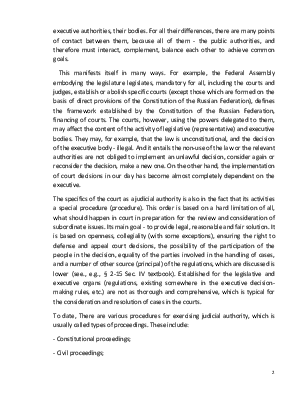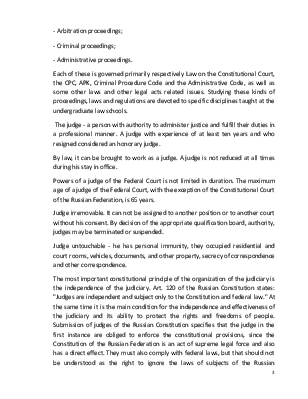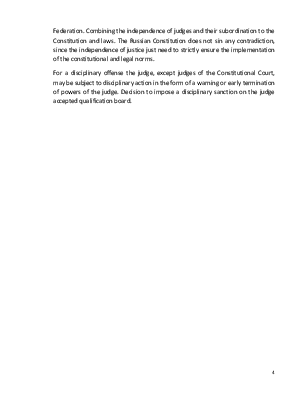



3
Inherent property of the judiciary, as shown above, is that its implementation is entrusted only to specially established State bodies - the courts. These government bodies are very different from other government agencies, including carrying out legislative and executive functions.
The difference is expressed not only in the specific judicial powers, as mentioned in the previous section of this chapter, but also in the construction of ships, especially - in the order of formation of the judiciary, which, ultimately, administers what is called the judiciary.
Below (see. Chap. XII textbook) will still be illuminated in detail the procedure for acquisition of ships personnel. It is sufficient to note that currently the courts of all types and levels are formed from specially -blyudeniem procedure established by law. Its implementation is designed primarily to ensure that judicial positions occupied by people, capable professional, competent, fair, thorough, complete, in good faith and honestly consider and resolve essentially related to their conduct of business. Achieving this goal should promote, in particular, the system of special protective measures to ensure penetration of the judiciary incompetent and immoral people, as well as enabling a timely and reasonable "cleaning" the body of those who fell into it by accident or was unable to adequately carry the title of the judge.
An important thing to remember about the judiciary, is to ensure their independence in the exercise of basic functions - justice or constitutional control. Their decisions in individual cases shall be protected from outside influence, both external and internal (from higher courts or "her" - the judicial authorities). This is not true of the legislative and executive bodies. Especially the latter, where subordination, subordinate to a superior, management believes is required to specify the phenomenon is quite normal, natural, even necessary and inevitable. Does not provide for any special measures, insulating legislators (members of representative bodies) from outside influence as to make it virtually impossible. This category of people in their activities must abide by external factors to take into account the requirements of social and political forces (parties, public associations, voters, etc.).
The foregoing, however, does not mean that there is an unbridgeable gulf between, on the one hand, the judiciary, and the other - the legislative and executive authorities, their bodies. For all their differences, there are many points of contact between them, because all of them - the public authorities, and therefore must interact, complement, balance each other to achieve common goals.
This manifests itself in many ways. For example, the Federal Assembly embodying the legislature legislates, mandatory for all, including the courts and judges, establish or abolish specific courts (except those which are formed on the basis of direct provisions of the Constitution of the Russian Federation), defines the framework established by the Constitution of the Russian Federation, financing of courts. The courts, however, using the powers delegated to them, may affect the content of the activity of legislative (representative) and executive bodies. They may, for example, that the law is unconstitutional, and the decision of the executive body - illegal. And it entails the non-use of the law or the relevant authorities are not obliged to implement an unlawful decision, consider again or reconsider the decision, make a new one. On the other hand, the implementation of court decisions in our day has become almost completely dependent on the executive.
Уважаемый посетитель!
Чтобы распечатать файл, скачайте его (в формате Word).
Ссылка на скачивание - внизу страницы.